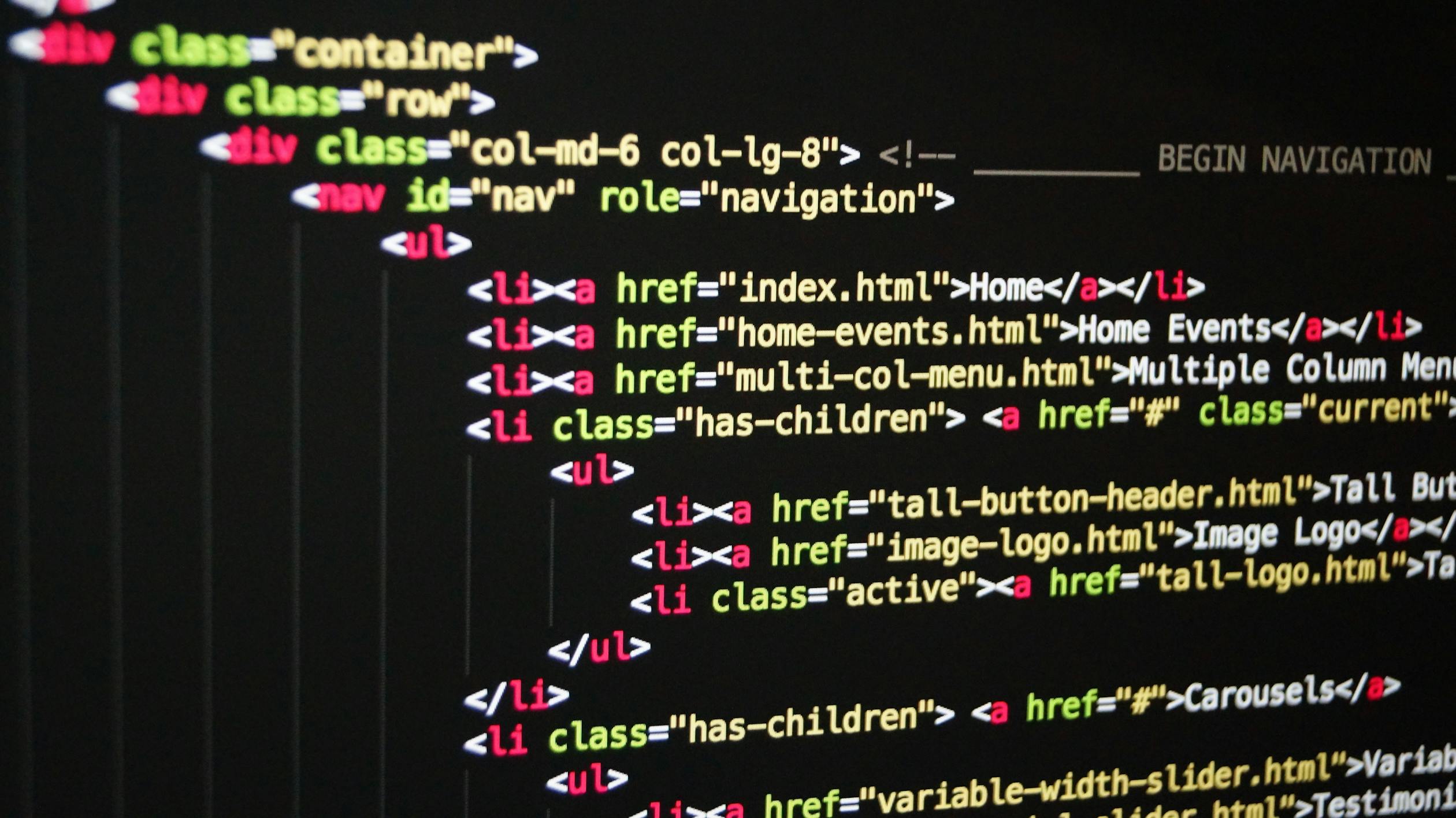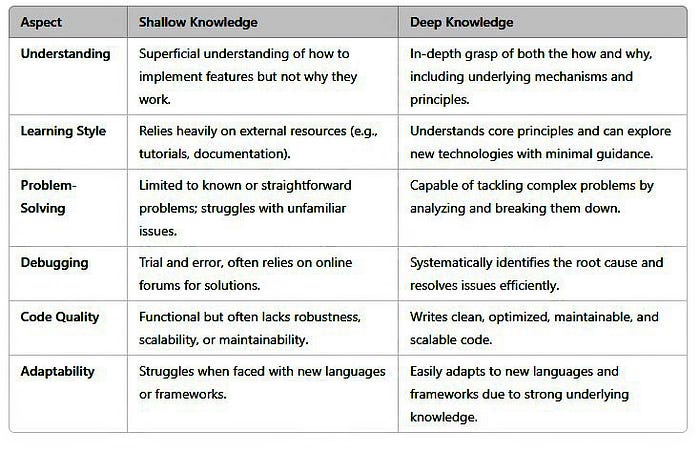
December 03, 2024
Deep Knowledge vs. Shallow Knowledge in Software Development: A Comprehensive Exploration
When it comes to software development, the distinction between deep knowledge and shallow knowledge often determines a developers effectiveness in solving complex problems, adapting to new technologies, and growing in their career. Both levels of knowledge play a role at different stages of learning and expertise. However, the leap from shallow understanding to deep mastery marks the difference between a novice and an expert.
In this article, we will explore these two levels of knowledge, understanding what each means in the context of coding, how they affect a programmers skills and problem-solving abilities, and how developers can deepen their understanding to become more proficient.
Understanding Shallow Knowledge in Coding
Shallow knowledge represents a limited understanding of programming concepts, where the focus is primarily on the surface-level aspects, such as syntax and following instructions to complete simple tasks. A person with shallow knowledge can often perform routine tasks but lacks the depth needed to navigate more complex or unfamiliar problems.
Characteristics of Shallow Knowledge:
- Knowing the How but not the Why: A developer with shallow knowledge may know how to implement a feature using a language or framework, but they often do not understand the underlying mechanisms that make it work. For example, they might write a loop to iterate through an array but struggle to explain how iteration interacts with memory allocation or performance.
- Reliance on Tutorials and Documentation: People with shallow knowledge often depend heavily on external resources like tutorials, blog posts, or documentation to complete their tasks. When they encounter a problem that has not been explicitly covered in the material they have studied, they may become stuck or frustrated. This reliance makes them less adaptable when trying to solve novel problems or work with new technologies.
- Limited Ability to Debug: Debugging becomes a significant challenge for developers with shallow knowledge. Since they lack a deep understanding of how different parts of the system interact, they may struggle to identify the root cause of a bug. Instead, they might apply superficial fixes without addressing the underlying problem, leading to temporary solutions rather than robust, lasting code.
- Difficulty with Conceptual Problem-Solving: Solving complex problems often requires abstract thinking and a deep understanding of programming principles. With shallow knowledge, developers tend to rely on rote memorization or following prescribed steps. When faced with challenges that deviate from the standard patterns they have learned, they may struggle to adapt.
Understanding Deep Knowledge in Coding
In contrast, deep knowledge signifies a comprehensive and thorough understanding of programming concepts, allowing developers to go beyond basic syntax and techniques. Developers with deep knowledge understand how and why things work, which allows them to build more complex, efficient, and scalable solutions. They can work with new or unfamiliar technologies because they understand the foundational principles that underlie most programming paradigms.
Characteristics of Deep Knowledge:
- Mastery of Core Concepts: Deep knowledge involves a robust understanding of the core principles of computer science and software engineering. Developers with deep knowledge can explain algorithms, data structures, memory management, and design patterns in detail. For example, they might understand why certain algorithms are more efficient in specific contexts or how different data structures affect the performance of a system.
- Abstract Problem-Solving: Deep knowledge enables developers to tackle complex and abstract problems effectively. They can break down large, multifaceted problems into smaller, more manageable components and develop optimized solutions. They do not rely on superficial patterns or quick fixes but instead analyze the problem deeply to ensure their solution is efficient and scalable.
- Understanding of System Behavior: Developers with deep knowledge can navigate the intricacies of software systems, understanding how different parts of a system interact with each other. They understand concepts like concurrency, multi-threading, event-driven architectures, and how data flows through different layers of an application. This system-level understanding helps them design better architectures and debug complex issues with confidence.
- Efficiency and Optimization: With deep knowledge comes the ability to optimize both code and systems. Developers who understand algorithms and computational complexity can make trade-offs between performance, memory usage, and readability. For example, they may know how to choose between using O(n) or O(log n) algorithms based on the specific requirements of the application. Similarly, they understand the cost of different operations, such as I/O and network requests, and can optimize code accordingly.
Key Differences Between Shallow and Deep Knowledge in Coding

Why Deep Knowledge Matters in Software Development
While shallow knowledge may suffice for simple tasks, deep knowledge becomes indispensable as projects grow more complex or as developers advance in their careers. Here is why deep knowledge matters:
- Scalability and Performance: In large-scale projects, efficient solutions and optimized code can dramatically affect performance and scalability. Developers with deep knowledge can design systems that handle significant traffic, optimize algorithms for speed, and manage resources effectively.
- Complex Systems: Modern software often involves distributed systems, microservices architectures, cloud computing, and real-time applications. These systems are complex, and shallow knowledge often leads to design flaws, performance bottlenecks, or hard-to-fix bugs. Developers with deep knowledge can handle these complexities with a more nuanced understanding of how different components interact.
- Long-Term Maintainability: Writing maintainable and scalable code requires a solid grasp of design patterns, best practices, and principles like SOLID, DRY (Do not Repeat Yourself), and KISS (Keep It Simple, Stupid). Developers with deep knowledge know how to apply these principles to ensure that codebases remain robust and adaptable as they evolve over time.
- Faster Learning and Adaptability: As technology evolves, developers must frequently learn new languages, frameworks, and tools. Those with deep knowledge of fundamental concepts can adapt faster because they recognize that these new technologies are often built on the same underlying principles they already understand.
- Leadership and Mentorship: Senior developers, team leads, and technical architects are expected to guide projects and mentor junior developers. Deep knowledge allows them to provide valuable insights, design scalable solutions, and help others grow.
How to Transition from Shallow Knowledge to Deep Knowledge
- Study Core Concepts: Begin by mastering core computer science concepts, including data structures, algorithms, and computational complexity. Understanding these foundations helps you solve problems efficiently and build better systems.
- Read Code and Understand Patterns: Explore well-written code in open-source projects and study common design patterns (e.g., Singleton, Factory, Observer). Learning how experienced developers structure their code can provide insight into scalable and maintainable practices.
- Engage with Real-World Projects: Real-world projects, particularly those with complex requirements, expose you to problems that can not be solved with shallow knowledge. Working on these projects forces you to think deeply and find better ways to structure your code.
- Focus on Problem-Solving: Engage in competitive programming on platforms like LeetCode, HackerRank, or Codeforces to practice solving algorithmic problems. This will sharpen your ability to think critically and handle abstract challenges.
- Continuous Learning and Reflection: Software development is an ever-evolving field. Continuous learning is key to staying relevant and deepening your understanding. Read books, research papers, and blog posts that delve into the intricacies of software design and architecture.
- Collaborate with Experienced Developers: Pair programming with more experienced developers or participating in code reviews can significantly enhance your understanding. Learning from others perspectives helps you avoid common mistakes and improve your problem-solving approach.
Conclusion
Both shallow and deep knowledge have their roles in the learning journey of a developer. While shallow knowledge allows for quick wins and early success, deep knowledge enables a developer to tackle more complex, scalable, and efficient solutions. As you progress in your career, developing deep knowledge becomes essential to mastering the craft of coding. By committing to continuous learning, practicing problem-solving, and understanding the underlying principles of software development, you can transition from a surface-level coder to a well-rounded, expert developer capable of navigating any challenge.
977 views
